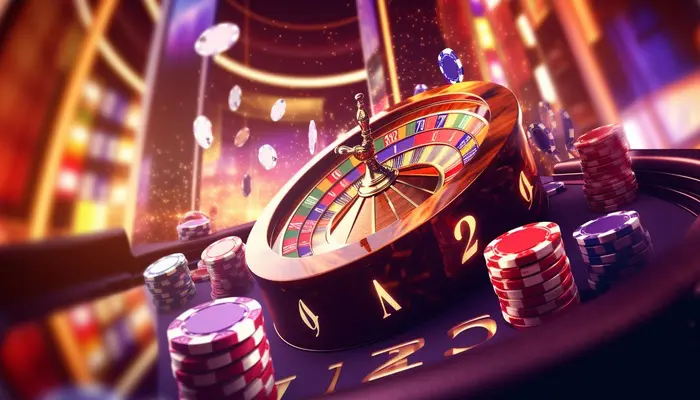Navigating the world of casinos can be both thrilling and daunting. The allure of winning big is ever-present, but understanding the mechanics behind the games is crucial. Casino odds, RTP, and house edge are terms often thrown around, yet they hold the key to making informed decisions. Whether you’re a seasoned gambler or a curious newcomer, grasping these concepts can significantly impact your gaming experience. This post delves into the intricacies of casino odds, strategies to enhance your chances, and the importance of managing your bankroll. By the end, you’ll have a clearer picture of how to approach casino games with a strategic mindset. The aim is to equip you with knowledge that not only enhances your enjoyment but also helps you make smarter choices. Let’s explore the fascinating world of gambling, where probability and strategy intertwine to create an engaging experience.
How do casino odds work?
Casino odds are the backbone of gambling. They determine the likelihood of winning a bet. Odds are expressed in various formats, such as fractions, decimals, or percentages. Each format conveys the same information: the probability of an event occurring. In simple terms, odds reflect how much you can win compared to your stake. For instance, odds of 2/1 mean you win $2 for every $1 wagered. Understanding odds is crucial for making informed bets. Casinos use odds to ensure they maintain a profit margin. This is where the concept of the house edge comes into play. The house edge is the percentage of each bet that the casino expects to keep over the long term. It’s how casinos ensure profitability. By understanding odds, players can assess the risk and potential reward of each bet. This knowledge empowers players to make strategic decisions, enhancing their gaming experience.
What is RTP in gambling?
RTP stands for Return to Player. It’s a crucial concept in gambling, especially in slot machines. RTP is expressed as a percentage, indicating the amount of wagered money a game will pay back to players over time. For example, a slot with an RTP of 95% will return $95 for every $100 wagered, on average. It’s important to note that RTP is calculated over a long period and many players. It doesn’t guarantee individual results. High RTP games are generally more favorable for players. They offer better chances of winning in the long run. However, RTP doesn’t account for short-term volatility. A game with a high RTP can still have significant swings in outcomes. Understanding RTP helps players choose games that align with their risk tolerance and gaming goals. It’s a valuable tool for making informed decisions in the casino environment.
Strategies to improve your chances of winning
Winning at casinos isn’t just about luck. Strategy plays a significant role. One effective strategy is to understand the games you’re playing. Each game has its own set of rules and odds. Familiarize yourself with them. Knowledge is power. Another strategy is to manage your bankroll wisely. Set a budget and stick to it. Avoid chasing losses. It’s easy to get caught up in the excitement, but discipline is key. Consider playing games with a lower house edge. These games offer better odds for players. Blackjack and baccarat are examples. Practice makes perfect. Many casinos offer free versions of their games online. Use these to hone your skills without risking money. Lastly, take advantage of bonuses and promotions. They can provide extra value and extend your playtime. Remember, no strategy guarantees a win, but it can improve your chances and enhance your overall experience.
Understanding house edge and its impact
The house edge is a fundamental concept in gambling. It represents the casino’s advantage over players. Expressed as a percentage, it indicates the average profit the casino expects to make from each bet. For example, a house edge of 5% means the casino expects to keep $5 for every $100 wagered. The house edge varies between games. Slot machines typically have a higher house edge compared to table games like blackjack or roulette. Understanding the house edge helps players make informed decisions. Games with a lower house edge offer better odds for players. However, it’s important to remember that the house edge is calculated over the long term. Short-term results can vary significantly. The house edge ensures that casinos remain profitable, but it doesn’t mean players can’t win. By choosing games with a lower house edge, players can improve their chances of winning and enjoy a more favorable gaming experience.
How to calculate expected value in casino games
Expected value (EV) is a key concept in gambling. It helps players assess the potential profitability of a bet. EV is calculated by multiplying the probability of each outcome by its corresponding payoff and summing the results. A positive EV indicates a favorable bet, while a negative EV suggests a losing proposition. For example, in a coin toss with a $1 bet, the EV is zero because the probability of winning or losing is equal. Understanding EV allows players to make informed decisions. It helps identify bets that offer value and avoid those with a negative expectation. Calculating EV requires knowledge of the game’s odds and payouts. It’s a valuable tool for strategic gamblers. However, it’s important to remember that EV is a long-term concept. Short-term results can deviate significantly from the expected value. By incorporating EV into their decision-making process, players can enhance their overall gambling strategy.
Differences between slot machine RTP and table game odds
Slot machine RTP and table game odds are distinct concepts. RTP, or Return to Player, is specific to slot machines. It represents the percentage of wagered money a slot will pay back to players over time. Table game odds, on the other hand, refer to the probability of winning a bet in games like blackjack, roulette, or poker. Slot machines typically have a fixed RTP, determined by the game’s design. Table game odds can vary based on the player’s decisions and strategies. For example, in blackjack, the odds can change depending on the player’s choices. Understanding these differences is crucial for players. Slot machines offer a more passive experience, with outcomes determined by chance. Table games require skill and strategy, allowing players to influence the odds. By recognizing these distinctions, players can choose games that align with their preferences and gaming goals, enhancing their overall experience.
Common misconceptions about casino odds
Casino odds are often misunderstood. One common misconception is that past outcomes influence future results. This is known as the gambler’s fallacy. In reality, each spin of the roulette wheel or roll of the dice is independent. Another misconception is that casinos manipulate odds to ensure players lose. While casinos have a built-in advantage, known as the house edge, they don’t alter odds mid-game. The odds are set by the game’s design and regulations. Some players believe that certain machines or tables are “”hot”” or “”cold.”” This is a myth. Outcomes are determined by random number generators, ensuring fairness. Understanding these misconceptions helps players approach gambling with a clear mindset. It’s important to rely on knowledge and strategy rather than myths. By dispelling these misconceptions, players can make informed decisions and enjoy a more rewarding gaming experience.
How to choose games with the best odds
Choosing games with the best odds is crucial for maximizing your chances of winning. Start by understanding the house edge. Games with a lower house edge offer better odds for players. Blackjack, baccarat, and craps are examples of games with favorable odds. Consider the RTP for slot machines. Higher RTP slots provide better returns over time. It’s also important to understand the rules and strategies of each game. Knowledge is power. Familiarize yourself with the games you’re interested in. Practice can improve your skills and increase your chances of winning. Take advantage of free versions of games online to hone your skills without risking money. Lastly, consider your preferences and gaming goals. Choose games that align with your interests and risk tolerance. By selecting games with the best odds and aligning them with your preferences, you can enhance your overall gaming experience and increase your chances of success.
The role of probability in gambling
Probability is the foundation of gambling. It determines the likelihood of different outcomes. Understanding probability helps players make informed decisions. Each game has its own set of probabilities. For example, in roulette, the probability of hitting a specific number is 1 in 37. Probability is expressed as a fraction, decimal, or percentage. It helps players assess the risk and potential reward of each bet. By understanding probability, players can choose bets that align with their risk tolerance and gaming goals. Probability also plays a role in determining the house edge and expected value. It’s a valuable tool for strategic gamblers. However, it’s important to remember that probability is a long-term concept. Short-term results can deviate significantly from the expected probabilities. By incorporating probability into their decision-making process, players can enhance their overall gambling strategy and increase their chances of success.
How to manage your bankroll effectively
Effective bankroll management is crucial for a successful gambling experience. Start by setting a budget. Determine how much money you’re willing to spend and stick to it. Avoid chasing losses. It’s easy to get caught up in the excitement, but discipline is key. Divide your bankroll into smaller sessions. This helps prevent overspending and extends your playtime. Consider using a stop-loss limit. This is the maximum amount you’re willing to lose in a session. Once reached, stop playing. It’s important to set win goals as well. Decide on a target amount to win and stop playing once achieved. This helps lock in profits. Avoid using credit or borrowing money to gamble. Only use funds you can afford to lose. By managing your bankroll effectively, you can enjoy a more sustainable and enjoyable gambling experience. It helps minimize losses and maximize your chances of success.
Understanding the mechanics of casino games is essential for a rewarding experience. From odds to RTP, each concept plays a role in shaping your strategy. By grasping these elements, you can make informed decisions and enhance your chances of winning. Remember, gambling is a blend of luck and strategy. While no method guarantees success, knowledge empowers you to play smarter. Choose games with favorable odds, manage your bankroll wisely, and dispel common misconceptions. This approach not only increases your enjoyment but also helps you navigate the casino landscape with confidence. Whether you’re a novice or a seasoned player, these insights provide a solid foundation for your gaming journey. Embrace the thrill of the game, but always play responsibly.


